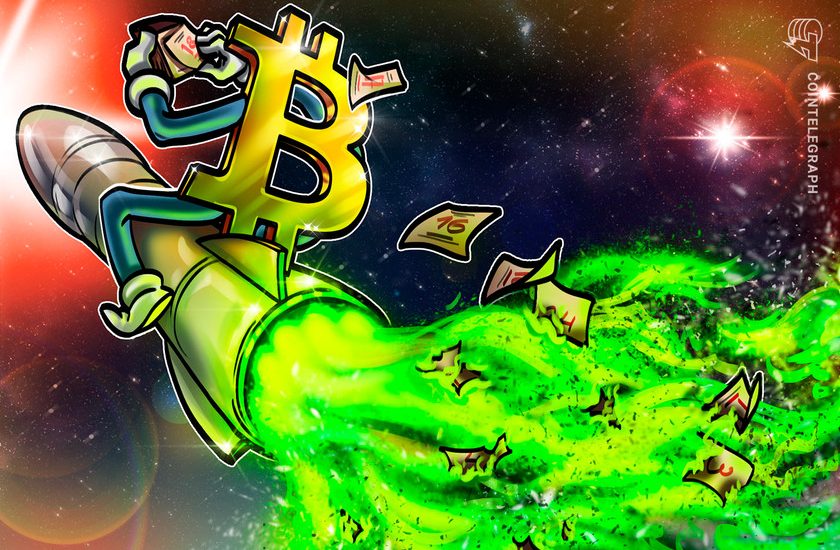- March 14, 2023
- Posted by: admin
- Category: BitCoin, Blockchain, Cryptocurrency, Investments


Bitcoin lines up a fresh charge at multi-month resistance, but BTC price action is already facing calls for a comedown triggered by CPI.
Bitcoin (BTC) eyed key resistance near $25,000 on March 14 as markets awaited key economic data from the United States.

Hopes CPI will bring Bitcoin “consolidation”
Data from Cointelegraph Markets Pro and TradingView showed BTC/USD making monthly highs of $24,917 on Bitstamp overnight.
The pair remained buoyant after the impact of multiple U.S. bank closures sent crypto markets skyrocketing.
Now, all eyes were temporarily on the Consumer Price Index (CPI) print for February when it came to short-term BTC price action.
A classic crypto volatility catalyst in itself, CPI last month showed an unwelcome slowdown in inflation abating, this in turn giving rise to fears that the Federal Reserve would keep interest rates higher for longer.
Risk assets had little time to worry, however, as the banking crisis subsequently overshadowed the inflation debate. On the day, expectations already pointed to the Fed abandoning rate hikes altogether — regardless of CPI trends.
“Bitcoin sweeping the highs here as it’s testing range high at $25K,” Cointelegraph contributor Michaël van de Poppe, founder and CEO of trading firm Eight, told Twitter followers.
“You’d preferably want to see some period of consolidation (CPI day today) before continuation. If markets sweep range high at $25.2K, make a bear. div and fall back, I’d be looking for shorts to $23K.”

On-chain monitoring resource Material Indicators pointed to a potential shake-up in order book composition thanks to CPI.
Should the data outpace expectations, bid support could “rug,” it warned, opening up the path for a deeper BTC price correction.
“Asia may continue to eat ask liquidity and clear a path for volatility before the CPI Report,” it commented about moves on the BTC/USD pair on Binance.
“If CPI is hot, I expect support to rug. If it’s cold, and another bank doesn’t go under before lunch, a bigger short squeeze.”
An accompanying chart from co-founder Keith Alan showed $23,600 and $25,000 as the principal areas of bid and ask liquidity, respectively.

Material Indicators added that in order for Bitcoin’s overall rally to have legs, it would need to deliver multiple weekly closes above its 200-week moving average (WMA).
“Need full candles above the 200 WMA to consider a breakout,” it confirmed.

CPI: “Maufactured” or “in some solid shape”?
Lower-than-expected CPI readings would boost the case for the Fed to lay off further rate hikes and loosen finanicial conditions.
Related: Fed starts ‘stealth QE’ — 5 things to know in Bitcoin this week
For his part, U.S. President Joe Biden last week appeared to have no concerns that inflation was on the right track, even before the banking crisis fully erupted.
In a White House press conference, Biden said that he was “optimistic we’re going to get the — the CPI next week. Hopefully, we’ll be in — in some solid shape.”
Among analysts, however, there were suspicions. A surprise drop in CPI would be most useful for a Fed currently backed into a corner by recent events, popular trader xTrends implied.
“I believe tomorrows CPI will be manufactured to prevent a market crash , and it will be silently revised weeks later like they did with the last few CPI numbers,” he revealed in part of Twitter commentary.
A starker warning on macro meanwhile came from Cathie Wood, CEO of ARK Invest, who issued a grim forecast for the consequences of any further rate hikes.
In a dedicated Twitter thread on March 13, Wood, under whose leadership ARK continues to increase crypto exposure, called for a Fed “pivot” on rates.
“If the Fed continues to focus on lagging indicators like the CPI, and does not pivot in response to the deflationary forces telegraphed by the inverted yield curve, then this crisis will devour more regional banks and further centralize, if not nationalize, the US banking system,” she wrote.
The views, thoughts and opinions expressed here are the authors’ alone and do not necessarily reflect or represent the views and opinions of Cointelegraph.
